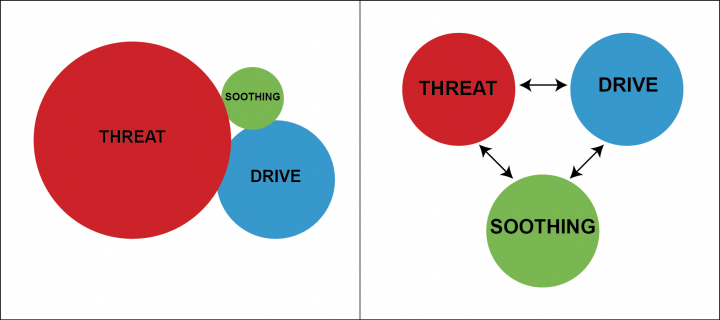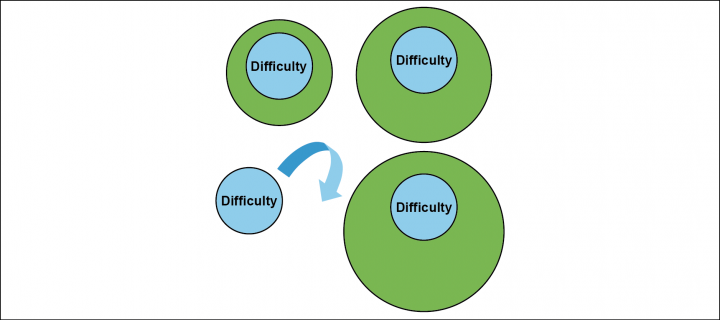Emotional well-being and managing stress
It is especially important to consider how we can best take care of ourselves during this unsettling and stressful time.
The importance of taking care of ourselves
You might be experiencing additional challenges for a number of reasons, including: worries about accessing medical treatment, addition stress and disturbed sleep which may exacerbate pain or reduce confidence to cope, and loss of routine and reduced opportunities for socialising or physical activity, or other things which helped you to cope.
Understandable increased sense of threat
The coronavirus may well contribute to an increased sense of threat. However, for people who have been living with problematic periods, this sense of threat may already be ‘online’ more of the time as it can also be triggered by health concerns, anaemia, pain, unpredictability and medical treatments. Some common experiences that come along with the sense of threat include:
Thoughts: I can’t cope, there is nothing I can do, things are out of control, what if….,
Body: heart racing, palpitations, muscle tension, stomach ache, tearful, poor concentration, pain
Emotions: Stressed, worried, irritable, numb, disconnected, sad, angry, frustrated, self-criticism
Behaviour: Push self, withdraw, skip meals/comfort eat, snap at others, stay up late, difficulty relaxing
IT IS COMPLETELY UNDERSTANDABLE AND NORMAL TO FEEL LIKE THIS AT THIS TIME
Humans have three basic emotional regulation systems: threat, drive and soothing systems. All serve very useful functions, but we need balance. The threat system may be especially online at the moment. To maintain balance, enable us to rest and for our well-being we need to bring the ‘soothing system’ online. Some tips strategies for this are described in the next section.

Tips and strategies for taking care of ourselves
Establish a routine: Build in a range of activities into your life so that your time does not feel entirely taken over by worries about your health and the current situation. Of course these concerns will be there but see if you can ‘grow’ around the challenges you are facing.
Each day try to tick off a few from this list:
- Being active/exercise
- Contact with others (friends/family)
- Pleasurable activity
- Time to relax
- Do something fun
- Give yourself a challenge (e.g. puzzle)

Limit exposure to ‘threat’ information: The empty shelves, news, social media, school and shop closures all keep this threat at the fore of our attention. Thoughts and worries about managing your periods at this time may add to this and will inevitably affect how we are thinking and feeling. Limit the amount of time you listen to the news, look on social media or spend looking up health information. Try to have some conversations or some allocated time which is ‘threat’ free.
Taking in the good: Negative events are like Velcro, positives are like Teflon: we notice and remember negative information more easily (e.g. we notice/remember what went wrong in our day, not what went well). In the current circumstances we may need to take some steps to balance our inbuilt negative attention bias by focusing on some of the good in our lives. For example,
- At the end of the day, see if you can think of 10 things you appreciate (e.g. the smile from a stranger, the smell of your coffee)
- Make time for pleasurable experiences and give them your full attention. You can do this for brief experiences (e.g. the feel of the sun on your skin) as well as longer ones (e.g. watch your favourite film)
- Do something kind – call a friend, make a cup of tea for someone, smile at someone
Look after your body: Try to eat healthily and regularly; if your appetite is low eat little and often, choose things you find easy to eat. Take a bath or long shower. Try to keep active.
Our thoughts: We may find ourselves overwhelmed with negative thoughts; how we think about a situation will affect how we feel. Remember, thoughts are not facts, and it might be helpful to keep other perspectives in mind, such as….
- I am limited in what I can do, but I will do what I can
- I can’t control many things, but I can look after myself
- This will end, we will get through this
- I’m not alone/others are facing challenges too
This isn’t about positive thinking. It’s about holding a balanced perspective in mind.
Living with uncertainty: It is common to find uncertainty difficult to live with, but sometimes our need for certainty can end up adding to our problems. For example, we might find ourselves going over and over things in our mind, feeling more stressed or frustrated, but the situation stays the same. Sometimes, no matter how hard we try to solve a problem, there is nothing we can do to change the situation or resolve the issue. Learning to accept situations we can’t change may sometimes be the most helpful thing to do. A helpful question to ask yourself is: Is this a worry I can do something about? If the answer is ‘no’, try the steps for accepting uncertainty (below).
Steps for accepting uncertainty:
- Be aware – What do you notice yourself thinking and feeling when the need for certainty comes up?
- Don’t respond – What can you tell yourself to help you not respond? (e.g. These feelings will pass)
- Let go – What can you do to help you let go of the need for certainty ? (e.g. I can’t fix/change this)
- Focus on the present – See the grounding techniques below.
- Deal with a wandering mind – Notice when your mind wanders, perhaps automatically getting caught up in worry again and again. Each time, gently bring your attention back to the present moment.
Acknowledging and naming emotions: Acknowledging and naming the emotion, either to ourselves or talking with someone else, can be helpful. Research shows this can help to give perspective and to calm emotions. For example, you could say to yourself “I notice I am feeling overwhelmed; I can see that I am feeling irritable”. Keeping a diary might be helpful.
Grounding techniques: When overwhelmed with emotion we can feel lost and disconnected from the present moment: our ability to think clearly and rationally may go ‘off-line’. Grounding techniques are a way of helping us to feel a little steadier and manage strong emotions, helping us connect with the present moment – the here and now. They can be quick strategies (like taking five mindful breaths) or longer, more formal exercises (like mindfulness meditation or yoga). Different strategies work for different people, and there is no “wrong” way to ground yourself. The main aim is to keep your mind and body connected and working together. Some ideas include:
- Come into your senses – stop, notice 5 things you can see, close your eyes and notice 5 things you can hear, and then notice 5 points of contact between your body and something else. Breathe. Then open your eyes.
- Take 5 breaths, paying full attention to the sensations of the breath.
- Focus on sensations in your feet as you walk from one place to another.
- Get outside – notice nature around you if you can access this. Feel the air on your skin.
Sleep is incredibly important. We know that poor quality or insufficient sleep makes it difficult to cope with things that you would normally manage fine.
- Routine: Establish a relaxing bedtime routine and give yourself longer to wind down at bed time (up to 90 minutes can be helpful)
- Keep bed for sleep (if you can): If you spend time in bed for reading, watching TV or resting, your body/mind may not associated bed with sleep. It’s important to create a strong link between bed and sleep by avoiding using bed for other activities.
- Rise time: If you haven’t slept well it can be tempting to have a lie in to catch up. Unfortunately, this is likely to decrease the likelihood of a good night sleep the following night, because you won’t have been awake long enough to build up ‘sleep pressure’ across the day. Set a regular rise time and see if you can stick to it. It might be hard work in the short term but will improve your chances of falling asleep each night. To help with getting out of bed at your rise time, plan some things to help get you going; perhaps a lively piece of music, a nice breakfast or a shower.
- Napping: If you can, it is best to avoid napping as it can lead to a disrupted sleep at night. The longer we are awake, the greater the ‘sleep pressure’ will be at night. If you do need to nap, try to keep it short (20 minutes) and earlier in the day to allow sleep pressure to build up again.
- Avoid stimulants before bed (caffeine, alcohol, nicotine)
- Natural light: Natural light suppresses the production of melatonin (a hormone associated with sleep). Try to avoid bright light before bedtime to promote melatonin production. It is also helpful to expose yourself to lots of natural daylight when it’s time to be awake (particularly early morning). This will help you to feel awake, alert and ready for the day.
- Screens/blue light: Avoid screens for an hour (or more) before bed as the blue light can supress melatonin production.
- Relaxation/mindfulness: Do a relaxation or mindfulness exercise (e.g. look on the internet for progressive muscle relaxation or a body scan) to help your mind and body wind down and ready for sleep.
If you can’t sleep, try not to worry about your sleep and see it as a time for rest – the more you worry, the less you will sleep! Try a relaxation exercise or mundane mental activity (e.g. counting down from 100 in 7’s; remember the details of a walk you know well).
Activities and relationships: Many people are enjoying the opportunity to play games or watch films with their family that they wouldn’t normally. Maybe this is something you can continue to plan in the future? However, it is challenging to spend all our time at home and this may be even more difficult if you are trying to both homeschool and work from home, or if one of your family is particularly stressed or anxious about the current situation. If you don’t feel safe at home then you should seek some advice, this resource may be helpful: https://www.womensaid.org.uk/covid-19-coronavirus-safety-advice-for-survivors/. If you are in immediate danger, call 999 and ask for the police - the police will continue to respond to emergency calls. If you are in danger and unable to talk on the phone, call 999 and then press 55. This will transfer your call to the relevant police force who will assist you without you having to speak.
* Faculty of Sexual and Reproductive Health (FSRH), Royal College of Obstetricians and Gynaecologists (RCOG), British Menopause Society (BMS), Royal College of General Practitoners (RCGP).

